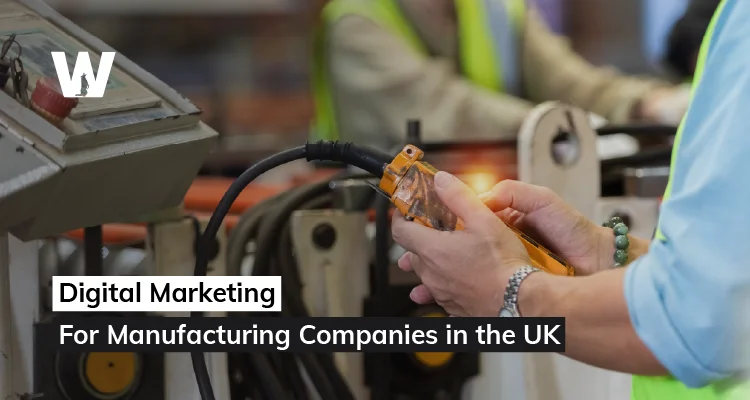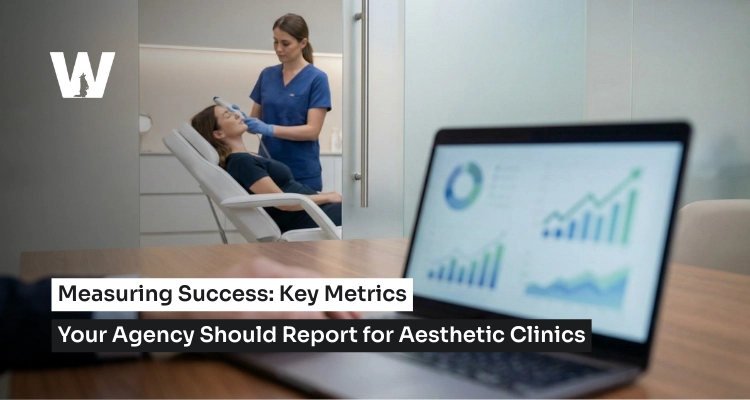Wraps up in 9 Minutes
Manufacturing companies in the UK are experiencing a digital revolution. Over 73% of UK manufacturers now invest in digital marketing, yet many struggle to achieve meaningful results. The difference? A strategic approach tailored specifically to the manufacturing industry's unique challenges and buyer behaviour.
This comprehensive guide reveals the exact strategies that work for UK manufacturing businesses in 2025.
Why Is Digital Marketing Essential for UK Manufacturing Companies?
Digital marketing isn't optional for UK manufacturers anymore—it's essential. Traditional marketing methods are struggling to engage today’s digitally-savvy buyers in an increasingly competitive and global marketplace.
What's Changed in UK Manufacturing Marketing Since 2020?
The pandemic accelerated digital adoption across all industries, but manufacturing saw the most dramatic shift. 87% of manufacturing buyers now complete their research online before speaking to a sales representative. Brexit has also forced UK manufacturers to diversify their marketing approaches, focusing more on digital channels to reach both domestic and international markets.
Industry 4.0 technologies aren't just transforming production—they're revolutionising how manufacturers connect with customers. Companies using digital-first marketing strategies report 34% higher lead generation compared to those relying solely on trade shows and print advertising.
How Does Traditional Marketing Compare to Digital for Manufacturers?
Traditional manufacturing marketing limitations:
- Print advertising offers no measurable ROI tracking
- Cold calling faces increasingly resistant prospects
- Geographic limitations restrict market expansion
Digital marketing advantages:
- Cost-effective: Digital campaigns cost 61% less than traditional methods
- Measurable: Track every pound spent and lead generated
- Targeted: Reach specific decision-makers with precision
- Scalable: Expand globally without proportional cost increases
Discover how UK manufacturers are scaling faster with digital—start your growth journey with us.
Who Are Your Manufacturing Target Audience?
Understanding your audience is crucial for manufacturing digital marketing success. B2B manufacturing sales involve multiple stakeholders, each with different priorities and information needs.
Who Makes Purchasing Decisions in UK Manufacturing?
Primary decision-makers include:
- Plant Managers (operational efficiency focus)
- Procurement Specialists (cost and compliance focus)
- Technical Engineers (specification and compatibility focus)
- Finance Directors (ROI and budget approval authority)
Each stakeholder researches differently. Plant managers prioritise operational benefits, whilst procurement specialists focus on cost comparisons and supplier reliability. Your digital marketing must address all these perspectives simultaneously.
What Does the B2B Manufacturing Customer Journey Look Like?
The manufacturing buyer's journey is notably longer than other B2B sectors, typically spanning 6-18 months from initial awareness to purchase decision.
Awareness Stage (Months 1-6):
- Problem identification and solution research
- Content consumption: industry reports, white papers
- Competitor comparison and market analysis
Consideration Stage (Months 4-12):
- Technical specification evaluation
- Vendor qualification and credibility assessment
- Stakeholder alignment and internal discussions
Decision Stage (Months 8-18):
- Detailed proposals and demonstrations
- Commercial negotiations and compliance verification
- Implementation planning and supplier onboarding
What Digital Marketing Channels Work Best for UK Manufacturers?
Not all digital channels deliver equal results for manufacturing companies. Success requires focusing on channels where your buyers actively research and engage.
How Can SEO Drive Manufacturing Leads?
Search Engine Optimisation remains the most cost-effective long-term strategy for UK manufacturers. 68% of manufacturing buyers begin their research with Google searches using highly specific technical terms.
Technical SEO priorities for manufacturing:
- Site speed optimisation: Manufacturing websites often contain heavy technical content and product specifications
- Mobile responsiveness: 45% of manufacturing research now occurs on mobile devices
- Structured data markup: Help search engines understand your product specifications and certifications
Keyword strategy for manufacturers: Focus on long-tail technical keywords rather than broad terms. "CNC machining services Birmingham" converts better than "manufacturing services" because it captures specific intent and local relevance.
Content optimisation approach:
- Product specification pages with detailed technical information
- Case studies showcasing measurable results and ROI
- Technical documentation and installation guides
- Industry news and regulatory compliance updates
Why Do PPC and LinkedIn Advertising Work for Manufacturing?
Pay-per-click advertising delivers immediate visibility for high-value manufacturing keywords, whilst LinkedIn provides unparalleled access to B2B decision-makers.
Google Ads strategies for manufacturers:
- High-intent keywords: Target specific equipment and service searches
- Geographic targeting: Focus on locations where you can provide services
- Ad extensions: Include certifications, locations, and contact information
- Landing page alignment: Match ad messaging with dedicated landing pages
LinkedIn advertising advantages:
- Precise targeting: Reach specific job titles, industries, and company sizes
- Professional context: Decision-makers are already in business mindset
- Lead generation forms: Capture leads without leaving the platform
- Content promotion: Amplify thought leadership and case studies
Manufacturing companies typically see 47% higher conversion rates on LinkedIn compared to other social platforms because the audience is professionally motivated and decision-ready.
What Content Marketing Strategies Generate Manufacturing Leads?
Content marketing builds trust and demonstrates expertise—crucial factors in high-value B2B manufacturing sales. However, manufacturing content must balance technical depth with accessibility.
High-performing content types:
- Technical white papers: In-depth analysis of industry challenges and solutions
- Video demonstrations: Product functionality and installation processes
- Case studies: Quantifiable results and ROI from real implementations
- Industry reports: Market insights and trend analysis
Video content particularly effective for manufacturing:
- Product demonstrations showing functionality and benefits
- Virtual factory tours building trust and transparency
- Installation and maintenance guides providing ongoing value
- Customer testimonials and success stories
Email nurturing for long sales cycles: Manufacturing sales cycles require sustained engagement. Automated email sequences should provide value at each buyer journey stage:
- Awareness stage: Industry insights and trend reports
- Consideration stage: Product comparisons and technical specifications
- Decision stage: Case studies and implementation guides
- Post-purchase: Maintenance tips and upgrade opportunities
How Can You Optimise Manufacturing Websites for Lead Generation?
Your website is often the first impression potential customers receive. Manufacturing websites must balance technical credibility with user-friendly navigation and clear conversion paths.
What Makes Manufacturing Landing Pages Convert?
Essential landing page elements:
- Clear value proposition: Communicate benefits within 5 seconds
- Trust signals: Certifications, awards, and client testimonials
- Technical credibility: Specifications, compliance information, and quality standards
- Mobile optimisation: Ensure functionality across all devices
Effective lead magnets for manufacturers:
- Technical specification guides and comparison charts
- ROI calculators and cost assessment tools
- Compliance checklists and regulatory guides
- Free consultations and facility assessments
How Does Marketing Automation Support Manufacturing Sales?
Manufacturing extended sales cycles make marketing automation essential for maintaining engagement without overwhelming sales teams.
Lead scoring for manufacturing:
- Demographic scoring: Job title, company size, industry relevance
- Behavioural scoring: Website engagement, content downloads, email interactions
- BANT qualification: Budget, Authority, Need, and Timeline assessment
Automated nurture sequences:
- Technical education track: For engineering stakeholders
- Business case track: For financial decision-makers
- Compliance track: For procurement and quality professionals
Sales and marketing alignment:
- Shared definitions: What constitutes a marketing qualified lead (MQL)
- Lead handoff processes: Automatic notifications and context sharing
- Feedback loops: Sales insights improving marketing targeting
How Do You Measure Manufacturing Digital Marketing Success?
Manufacturing marketing measurement differs from other industries due to longer sales cycles and higher transaction values. Focus on metrics that reflect long-term business impact rather than short-term engagement.
What KPIs Matter Most for Manufacturing Marketing?
Primary metrics:
- Cost per Lead (CPL): Total marketing spend divided by leads generated
- Marketing Qualified Lead to Sales Qualified Lead conversion: Quality indicator
- Pipeline velocity: Time from initial contact to closed deal
- Customer Lifetime Value (CLV): Long-term revenue per customer
Secondary metrics:
- Website conversion rate: Visitors to leads percentage
- Content engagement: Time on page and download rates
- Email nurturing effectiveness: Open rates and click-through rates
- Social media reach: LinkedIn engagement and share rates
How Do You Handle Attribution Challenges in Manufacturing?
B2B manufacturing involves multiple touchpoints across extended timeframes, making attribution complex but crucial for optimising marketing spend.
Attribution approaches:
- First-touch attribution: Credit the initial interaction
- Last-touch attribution: Credit the final conversion point
- Multi-touch attribution: Distribute credit across all touchpoints
- Time-decay attribution: Weight recent interactions more heavily
Reporting for manufacturing executives:
- ROI dashboard: Marketing investment versus pipeline generated
- Lead quality analysis: Conversion rates by source and campaign
- Competitive analysis: Market share and positioning insights
- Trend identification: Seasonal patterns and emerging opportunities
What's Your Implementation Strategy for Manufacturing Digital Marketing?
Successful digital marketing transformation requires structured implementation with realistic timelines and measurable milestones.
How Do You Build a Manufacturing Digital Marketing Foundation?
Essential technology stack:
- Customer Relationship Management (CRM): HubSpot, Salesforce, or Pipedrive
- Marketing automation platform: Marketo, Pardot, or HubSpot Marketing Hub
- Analytics tools: Google Analytics, Google Search Console, LinkedIn Analytics
- SEO platforms: SEMrush, Ahrefs, or Moz Pro
- Content management system: WordPress with manufacturing-focused themes
Budget allocation guidelines: Manufacturing companies should allocate 2-5% of annual revenue to marketing, with 60-70% dedicated to digital channels.
Team structure considerations:
- In-house team: Better industry knowledge and brand understanding
- Agency partnership: Access to specialised expertise and tools
- Hybrid approach: Core team in-house with agency support for specific capabilities
What Does a 90-Day Manufacturing Digital Marketing Roadmap Look Like?
Days 1-30: Foundation Building
- Website audit and technical SEO improvements
- Competitor analysis and keyword research
- Content strategy development and editorial calendar
- Marketing automation setup and lead scoring configuration
Days 31-60: Content Creation and Channel Launch
- Technical content creation: white papers and case studies
- SEO-optimised blog posts and landing pages
- LinkedIn company page optimisation and content strategy
- PPC campaign setup and initial testing
Days 61-90: Optimisation and Scaling
- Performance analysis and campaign adjustments
- A/B testing of landing pages and email sequences
- Content promotion and social media amplification
- Lead nurturing sequence refinement
What Compliance Considerations Affect UK Manufacturing Marketing?
GDPR compliance requirements:
- Explicit consent: Clear opt-in for marketing communications
- Data protection: Secure storage and processing of lead information
- Right to be forgotten: Systems for data deletion requests
- Privacy policies: Transparent data usage documentation
Industry-specific regulations:
- Health and safety communications: Accurate product safety information
- Environmental compliance: Sustainability claims and certifications
- Quality standards: ISO certifications and compliance messaging
- Export regulations: Post-Brexit international marketing considerations
Comparison Table: Digital Marketing Channels for Manufacturing
| Channel | Time to Results | Cost Effectiveness | Lead Quality | Best For |
|---|---|---|---|---|
| SEO | 6–12 months | High | Excellent | Long-term growth |
| PPC | 1–2 months | Medium | Good | Quick lead generation |
| 2–3 months | High | Excellent | B2B decision-makers | |
| Content Marketing | 3–6 months | High | Excellent | Trust building |
| Email Marketing | 1–3 months | Very High | Good | Lead nurturing |
| Trade Shows | Immediate | Low | Good | Relationship building |
Transform Your UK Manufacturing Business with Digital Marketing
Digital marketing success for UK manufacturing companies requires industry-specific expertise and strategic implementation. The manufacturing sector's unique challenges—long sales cycles, multiple decision-makers, and technical complexity—demand specialised approaches that generic marketing agencies often can't provide.
Ready to transform your manufacturing business through strategic digital marketing?
At Wolfable, we've helped numerous UK manufacturing companies transform their digital presence through targeted SEO, social media marketing, and video development.
Contact Wolfable today to discuss your manufacturing digital marketing goals and learn how our specialised approach can drive measurable results for your business.







